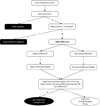Explaining the sex difference in dyslexia
- PMID: 28176347
- PMCID: PMC5438271
- DOI: 10.1111/jcpp.12691
Explaining the sex difference in dyslexia
Abstract
Background: Males are diagnosed with dyslexia more frequently than females, even in epidemiological samples. This may be explained by greater variance in males' reading performance.
Methods: We expand on previous research by rigorously testing the variance difference theory, and testing for mediation of the sex difference by cognitive correlates. We developed an analytic framework that can be applied to group differences in any psychiatric disorder.
Results: Males' overrepresentation in the low performance tail of the reading distribution was accounted for by mean and variance differences across sex. There was no sex difference at the high performance tail. Processing speed (PS) and inhibitory control partially mediated the sex difference. Verbal reasoning emerged as a strength in males.
Conclusions: Our results complement a previous finding that PS partially mediates the sex difference in symptoms of attention deficit/hyperactivity disorder (ADHD), and helps explain the sex difference in both dyslexia and ADHD and their comorbidity.
Keywords: Reading; dyslexia; inhibition; processing speed; sex difference; verbal reasoning.
© 2017 Association for Child and Adolescent Mental Health.
Conflict of interest statement
The authors do not have any conflicts of interest.
Figures




References
-
- Camarata S, Woodcock R. Sex differences in processing speed: Developmental effects in males and females. Intelligence. 2006;34(3):231–252.
-
- Christopher ME, Keenan JM, Hulslander J, DeFries JC, Miyake A, Wadsworth SJ, Olson RK. The genetic and environmental etiologies of the relations between cognitive skills and components of reading ability. Journal of Experimental Psychology General. 2016;145(4):451–466. PMCID: PMC4792094. - PMC - PubMed
-
- DeFries JC, Corley RP, Johnson RC, Vandenberg SG, Wilson JR. Sex-by-generation and ethnic group-by-generation interactions in the Hawaii family study of cognition. Behavior Genetics. 1981;12(2) - PubMed
Publication types
MeSH terms
Grants and funding
LinkOut - more resources
Full Text Sources
Other Literature Sources
Medical

